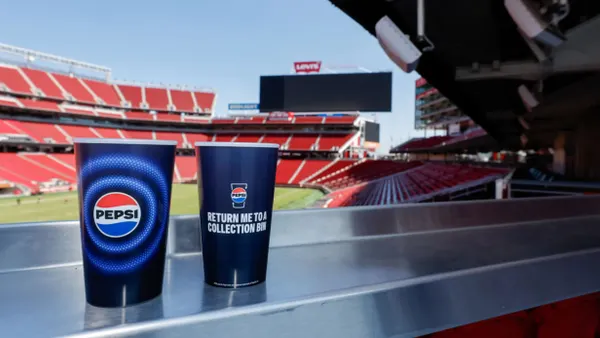Dive Brief:
- The California Department of Resources Recycling and Recovery (CalRecycle) invited packaging stakeholders to an event earlier this month to explain how they plan to help California recover more plastics. There, they discussed two recycling goals to reach by 2020: cutting packaging disposal by 50%, and recycling 75% of all materials entering its waste stream.
- Officials are calling on packaging stakeholders to help them reach those goals, and decided to see if they will do so on a voluntary basis rather than impose a mandatory approach previously recommended by CalRecycle. Though CalRecycle expects the packaging industry to lay out a "comprehensive" strategy, as reported in Resource Recycling.
- While multiple issues in achieving these goals came up at the meeting, energy recovery was among the most debated.
Dive Insight:
California has gotten flack from some plastics industry representatives, while receiving support from others, especially on the plastic bag ban front. But CalRecycle hopes the robust attendance at its January event is an indication that a voluntary approach to reducing waste, namely from plastic packaging, will work well.
"Almost all of the organizations we invited participated, and that's something we had hoped would happen regardless of what happens afterwards," Cynthia Dunn, the meeting's organizer, told Resource Recycling.
Kyla Fisher, who presented for American Institute for Packaging and the Environment, said, "I think everybody at that table was really there to say, 'These are the projects that we're working on in terms of addressing the challenges in the recovery system.'"
Her suggestion to help meet the state’s 2020 target was to view recovery "from a holistic standpoint" —including focusing on energy recovery. "You can't look at recovery in isolation," she said.
But CalRecycle does not believe energy recovery needs to be part of the equation; rather the state should focus elsewhere.
"We recognize there are some significant challenges – we need more organics processing infrastructure just like we need more infrastructure to process and re-manufacture using plastics and various other materials. But at the same time, it's ultimately going to be a partnership between the state, between the industry, between the manufacturers, between local governments, to make all of this work," said CalRecycle spokesperson Mark Oldfield.
Waste Dive plans to investigate these issues and more at Resource Recycling's "Plastics Recycling 2016" conference in early February.









